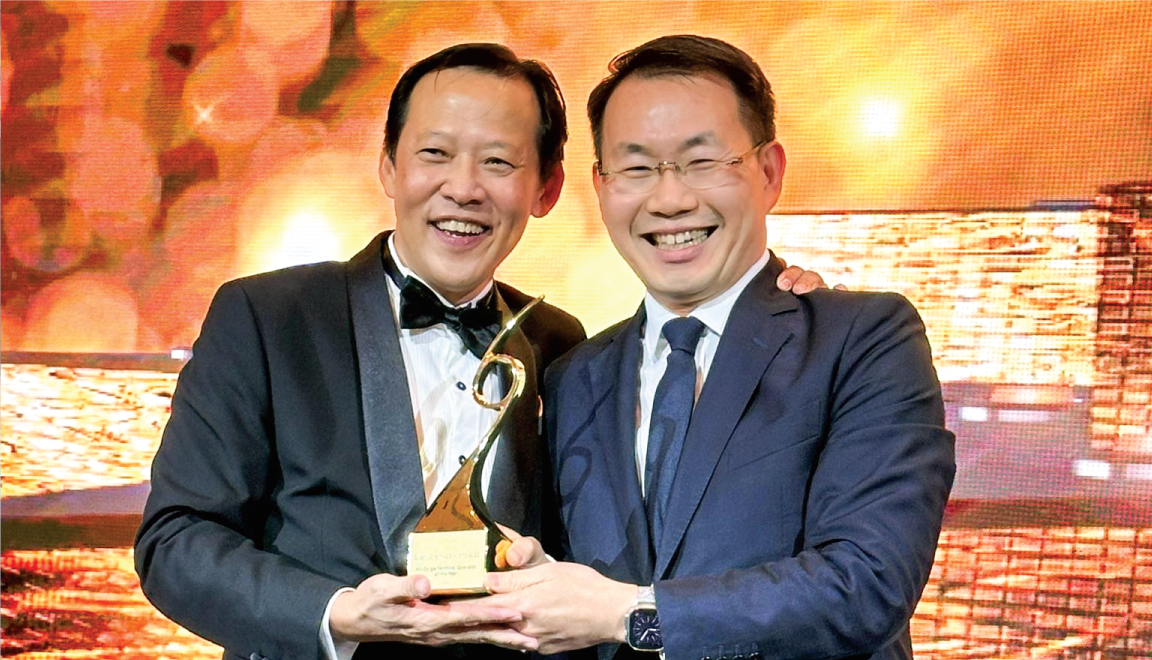In the current changing market we are not going to change our strategy, we are just going to change our tactics. Scheduled freighter services with ad hoc charters is our DNA and will remain our DNA.
Copyright © Hong Kong Air Cargo Industry Services Limited. All Rights Reserved.
Face to face with Wolfgang Meier
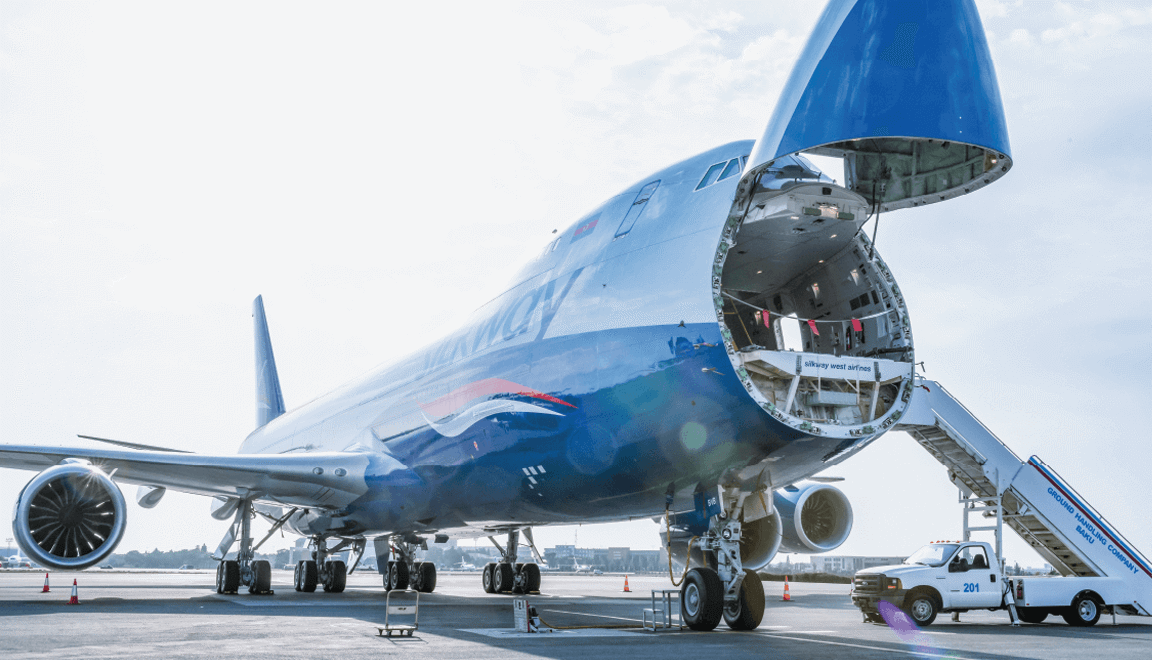
Silk Way West Airlines is one of two airlines in the Silk Way Group; it is essentially a scheduled all-cargo operator with a fleet of twelve B747s and two B737Fs, while sister airline Silk Way Airlines operates IL-76s for outsize, offline assignments. Explains Wolfgang: “We have two separate AOCs (Air Operators Certificates) for the two airlines in the Silk Way Group, but some of the back office functions are shared. The interaction between the IL-76 and B747 operations will get even closer in future, because the mainstream market is declining after a very strong two-and-a-half years, and the demand for outsize equipment is going up; this is where we are trying to work against the market.”
Silk Way West Airlines serves around 40 destinations from its hub in Baku, Azerbaijan; they are generally in the northern hemisphere, where most of the world’s GDP is generated. “Our main activity is in Asia, North America, Europe, Middle East and Central Asia. More than 80% of our traffic is transhipped in Baku. We have 2 warehouse complexes, we have just refurbished our temperature controlled area and our processes are GDP (Good Distribution Practices) certified; we have invested a lot and have a real hub and spoke operation.
“Our fleet of twelve B747s — five Dash 8s and seven 400s — are all factory-built; we don’t believe in conversions. In the next seven years we will get five new B777Fs and two A350Fs.” These new aircraft are intended as replacements for the 400s, some of which may be kept longer subject to demand for their nose-loading capability. The newer Dash 8s have a 25-30 year life expectancy and are nose-loaders too, so Wolfgang sees no problem in accommodating long loads well into the future. “The older aircraft are getting less efficient, and there are environmental issues. The future of our company cannot be based on aircraft that are over 30 years old.”

Dedicated flights
Although Silk Way West Airlines considers itself a scheduled operator first and foremost, ad hoc charters have increased in the past two years. Another growth area is dedicated flights for forwarders and logistics service providers: “It was not such a big step for us. We already had big BSAs (Block Space Agreements) with the top 10 global forwarders; one after another they extended that to full aircraft.”
Wolfgang sees Silk Way West Airlines’ main competitive edge as its location: “We are at the crossroads of the Orient and Occident,” he says, adding: “We also have the right people, the right aircraft and the right strategy. In the current changing market we are not going to change our strategy, we are just going to change our tactics. Scheduled freighter services with ad hoc charters is our DNA and will remain our DNA.”
Part of Silk Way West Airlines’ strength is its people, he continues: “We are not a hire and fire company. Most managers have been with us for a long time. Once we decide to work with people, we really work with them; it’s another part of our DNA.” He cites Zaur Bakhtiyarov, Commercial Director APAC, as an example: “He’s a very experienced manager who has proven he is a valuable asset. Through good times and bad, we try to create a family environment. I think we have a lot of good characters.”
Silk Way West Airlines emerged from the pandemic in great shape due to careful cost controls: “We kept our management team compact, and have not added unlimited resources or huge additional capacity.” Instead, Silk Way West Airlines focused on full utilisation of its current fleet, only adding two B737-800 freighters for feeder operations. “We invested in more loadmasters because we anticipated the heyday could be over; in fact it’s coming a little sooner than we expected. We prepared ourselves for huge demand in future for outsize cargo.”
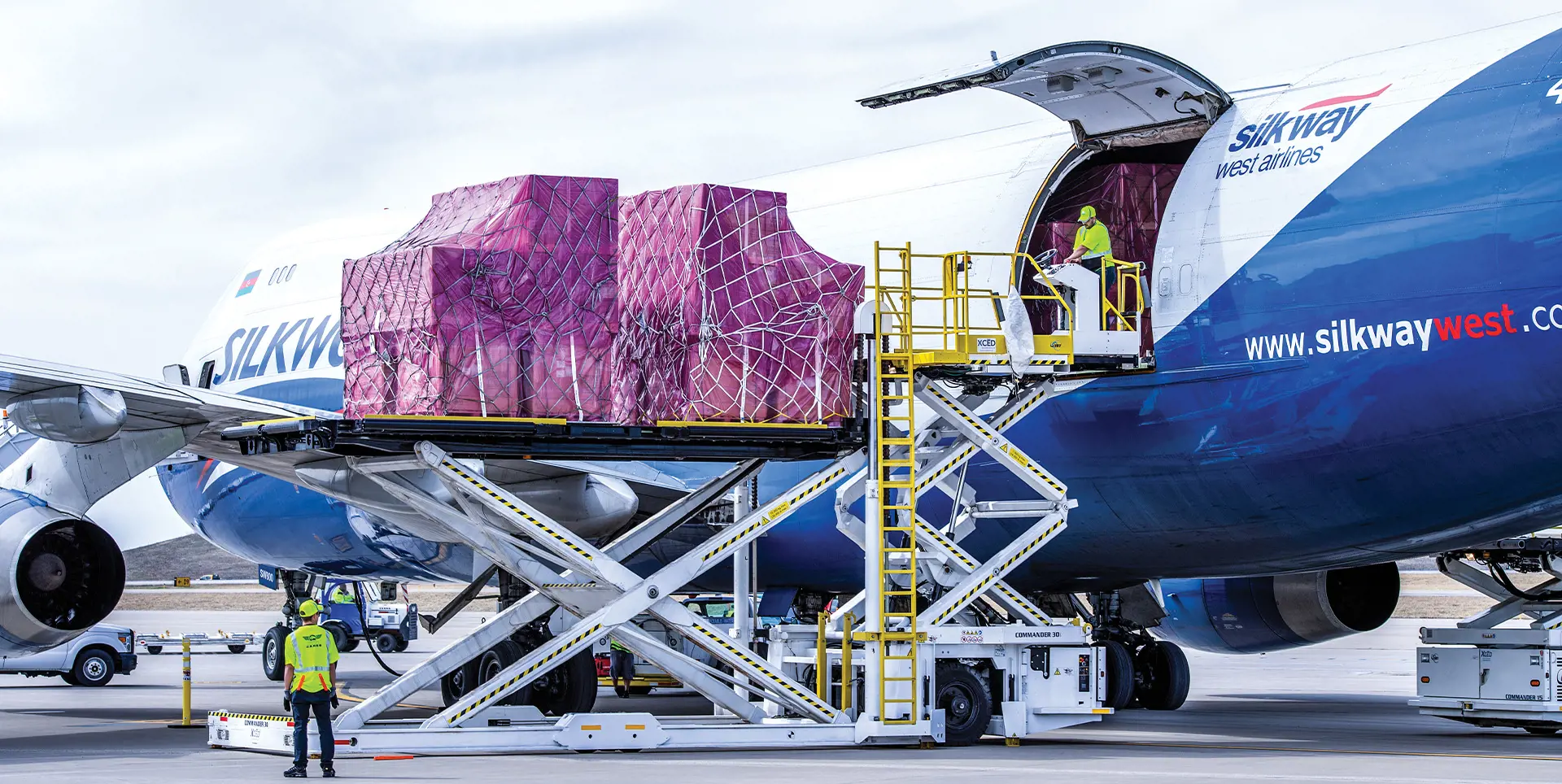
Always learning
Wolfgang fervently believes air cargo remains a people business, and the airline’s compact management structure supports this: “Customers can expect the people they talk to also make the decisions; we try to keep the decision-making process very lean, and I see this as a big differentiator. Yes, we have launched digital bookings, and digitalisation will move further into our upstream production and downstream sales processes. But at the end of the day I am an old-fashioned guy and I think you have to be reachable and talk and meet with people; I very much enjoy that because I am always learning from our customers about their businesses.”
After the pandemic, what next? “To understand the future,” asserts Wolfgang, “you have to understand a little of the past. Cargo carriers were the stepchild of the industry: it was good to have them, but also good to have all the belly capacity. Then, all of a sudden at the beginning of the pandemic, cargo carriers rose like phoenixes from the ashes: we were the saviours of the aviation industry. I even felt I was finally becoming a very prominent person in my older days!
“But we were never naïve: we knew that what goes up must come down. Things are now normalising; last year people were saying this situation would last another five years, now they are telling you it’s all over. Personally, I think it’s somewhere in between: I don’t think rates will return to pre-COVID levels. Supply chains are not so robust, especially with ongoing problems in ocean freight, that customers will run back to bellyhold capacity. Their risk management will dictate that they mitigate risks, and share cargo between bellyholds and full freighter services. So everything will not be as bad as before, but also not as good as it has been. I forecast a medium scenario for us.”
Personally, I think it’s somewhere in between: I don’t think rates will return to pre-COVID levels.
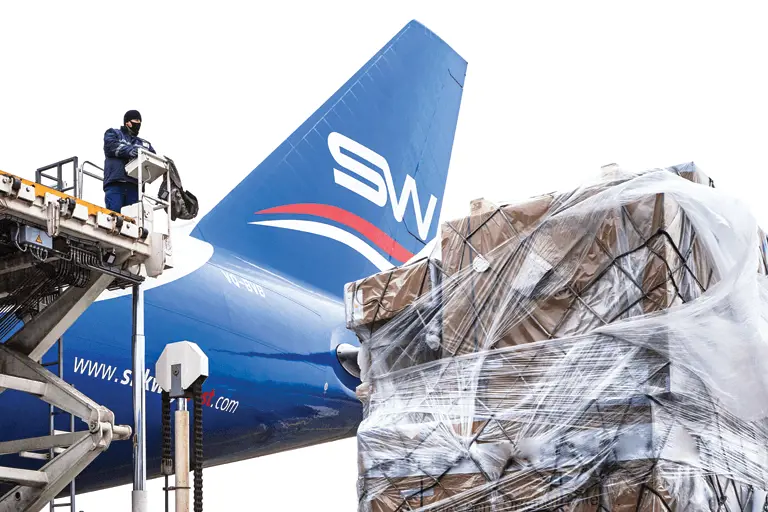
Sad story
Speaking of the effect of the Russian carriers disappearing from the market, including Wolfgang’s former employers AirBridgeCargo, he says: “It’s a very sad story. I worked for 7 years for VDA group. I know the people. Do I feel bad about it? Absolutely. Am I happy that they are out of the business? For sure, not. Their owner built up a world class operation, and a leader in outsize cargo. That they are gone is not good for the industry. But it’s a relative question whether this capacity is missed: if it weren’t for the Ukraine conflict, they would still be in the market, but the market would also be much better than it is.”
Silk Way West Airlines has always been strong in the oil and gas business; even when oil and gas prices were down, they moved large quantities of drilling equipment. “Our fleet is perfectly geared to moving outsize cargo and we have even moved entire drilling rigs,” continues Wolfgang. The past 15 months have seen a definite upsurge, as many economies revise their immediate-term energy strategies.
But Wolfgang is more cautious than many about the prospects for lithium battery traffic; although the exclusive preserve of freighters nowadays, he says car makers are also ramping up nearshore battery-making capacity, “So I don’t see a huge spike coming.”
The pandemic brought huge opportunities to Silk Way West Airlines, but also challenges. “We dealt with problems of a different dimension that we never expected,” says Wolfgang. Pilots were forced to fly to places that were “not so nice” and the airline had to cope with handling problems at various places where there were many restrictions. “We mastered these challenges together. If I ever write my memoirs I will mention that as a very special moment in my life.”
Freighters became a very important part of the supply chain during the pandemic, and Wolfgang hopes they will remain so: “If I ran a global logistics company I would tell my people that I want a share of our air cargo business flown on cargo carriers, because it’s a risk mitigation. Who can say that there is not another pandemic ahead?”
From day one of the pandemic we kept our network alive, and kept supply chains going; you can only do this with a good partnership.
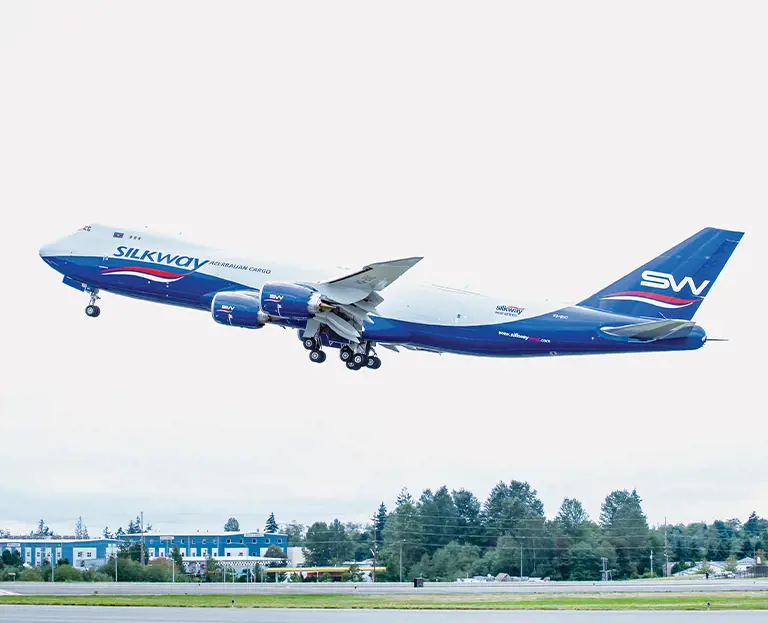
Still a powerhouse
Silk Way West Airlines has served Hong Kong since 2011, now operates daily B747s, and has no plans to change that. Despite questions over its future role, as China develops its own direct air services, Wolfgang asserts: “It is still a powerhouse, and will remain a powerhouse.”
Silk Way West Airlines has been working with Hactl since the very beginning, and Wolfgang says: “We have a very good relationship on different levels; this is how it should be. From day one of the pandemic we kept our network alive, and kept supply chains going; you can only do this with a good partnership. You always see the real character of people in challenging times; it was a very good collaboration. We never took a single plane out of the market; that says everything.” Silk Way West Airlines also uses Hacis’ SuperLink China Direct road feeder service system, which it says plays an important role in extending its market catchment.
Wolfgang has notched up 38 years in air cargo, and claims: “It’s the only thing I can do!” He served his apprenticeship at Kuehne+Nagel, before moving to Panalpina for 20 years — the last few developing their in-house carrier system: “I was already in an airline kind of environment, although I only had one customer!” Eventually, he moved over to the airline side of the industry where he was fascinated to learn the more technical aspects of the business. “I trained as a forwarder. The benefit is I have the empathy to understand what our customers want because I sat on the other side of the table for a long time.”
Of his job, Wolfgang says: “Work is work and duty is duty, but my work doesn’t feel like a duty, because I like what I do and I like airfreight. I would not describe myself as a workaholic: it’s too negative.” When not working, Wolfgang busies himself with his five children aged 7 to 23, and takes an interest in old cars and prop liners. “I am an old-fashioned guy, and can still repair some of the cars myself; with today’s cars that’s not possible!”
Wolfgang wants Silk Way West Airlines to be the carrier of choice for customers. “We want to grow the business, but in a controllable fashion; we don’t need to achieve growth at any cost. We want a profitable and sustainable environment. We don’t want to build ivory towers, but to be reachable for our customers. We want to be visible as an important part of their supply chains.”





